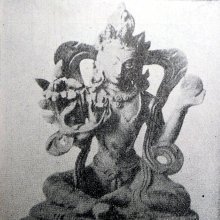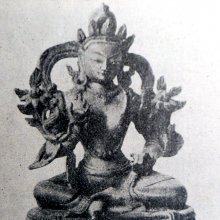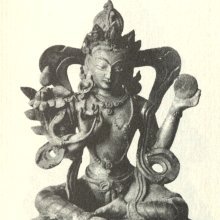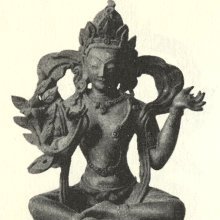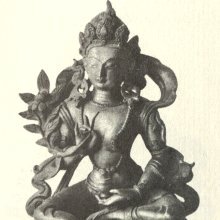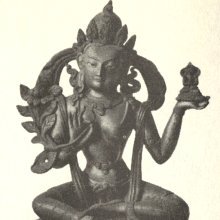Vasita, Vāsita, Vaśitā, Vaśita, Vasitā, Vashita, Vāśita, Vāśitā, Vāsitā: 25 definitions
Introduction:
Vasita means something in Buddhism, Pali, Hinduism, Sanskrit, Marathi, Hindi. If you want to know the exact meaning, history, etymology or English translation of this term then check out the descriptions on this page. Add your comment or reference to a book if you want to contribute to this summary article.
The Sanskrit terms Vaśitā and Vaśita and Vāśita and Vāśitā can be transliterated into English as Vasita or Vashita, using the IAST transliteration scheme (?).
Images (photo gallery)
(+6 more images available)
In Hinduism
Yoga (school of philosophy)
Source: Wisdom Library: YogaVaśita (वशित) is a Sanskrit word referring to the “ability to completely subjugate and control others”, as described in the Yoga Sūtras of Patañjali.

Yoga is originally considered a branch of Hindu philosophy (astika), but both ancient and modern Yoga combine the physical, mental and spiritual. Yoga teaches various physical techniques also known as āsanas (postures), used for various purposes (eg., meditation, contemplation, relaxation).
Vastushastra (architecture)
Source: Wisdom Library: Vāstu-śāstraVasita (वसित) is a Sanskrit technical term denoting a “residence” in general, according to the lists of synonyms given in the Mānasāra XIX.108-12, which is a populair treatise on Vāstuśāstra literature.

Vastushastra (वास्तुशास्त्र, vāstuśāstra) refers to the ancient Indian science (shastra) of architecture (vastu), dealing with topics such architecture, sculpture, town-building, fort building and various other constructions. Vastu also deals with the philosophy of the architectural relation with the cosmic universe.
Purana and Itihasa (epic history)
Source: Cologne Digital Sanskrit Dictionaries: The Purana IndexVaśita (वशित).—A Siddhi devī.*
- * Brahmāṇḍa-purāṇa IV. 19. 4; 44. 140.

The Purana (पुराण, purāṇas) refers to Sanskrit literature preserving ancient India’s vast cultural history, including historical legends, religious ceremonies, various arts and sciences. The eighteen mahapuranas total over 400,000 shlokas (metrical couplets) and date to at least several centuries BCE.
Natyashastra (theatrics and dramaturgy)
Source: Wisdom Library: Nāṭya-śāstraVāsita (वासित) is another name (synonym) of bhāva, referring to “psychological states” (eg. permanent, involuntary, transitory), according to the Nāṭyaśāstra chapter 7.

Natyashastra (नाट्यशास्त्र, nāṭyaśāstra) refers to both the ancient Indian tradition (shastra) of performing arts, (natya—theatrics, drama, dance, music), as well as the name of a Sanskrit work dealing with these subjects. It also teaches the rules for composing Dramatic plays (nataka), construction and performance of Theater, and Poetic works (kavya).
Kavya (poetry)
Source: archive.org: Naisadhacarita of SriharsaVāsita (वासित) refers to “perfumed”, and is mentioned in the Naiṣadha-carita 8.77.—(“candanavāsitā dik”); 21.119 (“purified”, “edified”—“saṃprajñātavāsitatamaḥ”). Cāṇḍūpaṇḍita says “saṃskṛtatamaḥ”. Nārāyaṇa says “atitarāṃ saṃbhāvitamanāḥ”.

Kavya (काव्य, kavya) refers to Sanskrit poetry, a popular ancient Indian tradition of literature. There have been many Sanskrit poets over the ages, hailing from ancient India and beyond. This topic includes mahakavya, or ‘epic poetry’ and natya, or ‘dramatic poetry’.
In Buddhism
Tibetan Buddhism (Vajrayana or tantric Buddhism)
Source: archive.org: The Indian Buddhist IconographyVaśitā (वशिता) refers to a group of twelve deities, commonly depicted in Buddhist Iconography, and mentioned in the 11th-century Niṣpannayogāvalī of Mahāpaṇḍita Abhayākara.—The Vaśitās according to Buddhism, are the controls or disciplines which lead to the spiritual regeneration of its followers. The Vajrayānists recognized twelve Vaśitās, each with a special name and conceived them in the form of deities with heads, arms, weapons and special symbols. These Vaśitās are collectively taken to be the spiritual daughters of the Dhyāni Buddha Amitābha.
The description of the Vaśitā goddesses is not found in the existing original literature and thus it is of unusual interest. Their iconographic interest becomes all the more attractive since in China there are statuettes in metal which correctly represent the Vaśitā goddesses. Statues of these are not found anywhere in India, but their statuettes in the Chinese collection of Buddhist deities at Peiping are illustrated in the Two Lamaistic Pantheons of W. E. Clark.
Source: eScholarship: The Development of Esoteric Buddhist Scholasticism in Early Medieval JapanVaśitā (वशिता) refers to “control (over all dharmas)”, according to the Mahāvairocana-sūtra (Cf. Taishō 18.14c15-19).—Accordingly, “Then the World-honored One Śākyamuni entered the samādhi ‘Place of Jewels’ and uttered his own heart[-mantra] and the mantras of his attendants: ‘namaḥ samantabuddhānāṃ, sarva kleśaniṣūdana sarvadharma vaśitāprāpta gaganasamāsama svāhā’—(Homage to all Buddhas! O you who destroy all defilements! you who have won control [i.e., vaśitā-prāpta] over all dharmas! you who are equal to the sky and unequaled! svāhā!)”—(Cf. Giebel 2005, 61).

Tibetan Buddhism includes schools such as Nyingma, Kadampa, Kagyu and Gelug. Their primary canon of literature is divided in two broad categories: The Kangyur, which consists of Buddha’s words, and the Tengyur, which includes commentaries from various sources. Esotericism and tantra techniques (vajrayāna) are collected indepently.
Mahayana (major branch of Buddhism)
Source: Wisdom Library: Maha Prajnaparamita SastraVaśita (वशित) refers to “(obtaining) mastery (over all the dhyānas of the heretics)”, according to Mahāprajñāpāramitāśāstra (chapter 8).—Accordingly, “[Question: How does the Bodhisattva fulfill the virtue of meditation (dhyānapāramitā)?]—[Answer]—When he obtains mastery (vaśita) over all the dhyānas of the heretics (tīrthika). Thus king Śaṅkhācārya, seated in meditation, had no in- (āna) or out- (apāna) breath. A bird came and laid her eggs in his top-knot which was in the form of a conch (śaṅkhaśikhā); the Bodhisattva remained motionless (acala) until the fledglings flew away”.
Source: academia.edu: A Study and Translation of the GaganagañjaparipṛcchāVaśitā (वशिता) refers to “mastery (of the arising of birth and death)”, according to the Gaganagañjaparipṛcchā: the eighth chapter of the Mahāsaṃnipāta (a collection of Mahāyāna Buddhist Sūtras).—Accordingly, “[...] Then, the bodhisatva, the great being, Gaganagañja addressed himself to the Lord: [...] (27) [How do the Bodhisattvas] purify their own realm (svaviṣaya) after having obtained the realm of the Buddha? (28) [How do the Bodhisattvas] obtain memory without forgetfulness? (29) [How are the Bodhisattvas] always supported by the presence of the Buddha and thus having unhindered eloquence? (30) [How do the Bodhisattvas] attain the mastery (vaśitā-prāpta) of the arising of birth and death? [...]’”.

Mahayana (महायान, mahāyāna) is a major branch of Buddhism focusing on the path of a Bodhisattva (spiritual aspirants/ enlightened beings). Extant literature is vast and primarely composed in the Sanskrit language. There are many sūtras of which some of the earliest are the various Prajñāpāramitā sūtras.
General definition (in Buddhism)
Source: Wisdom Library: Dharma-samgrahaVaśitā (वशिता) or Daśavaśitā refers to the “ten masteries of the Bodhisattvas” as defined in the Dharma-saṃgraha (section 74):
- āyur-vaśitā (mastery of life),
- citta-vaśitā (mastery of mind),
- pariṣkāra-vaśitā (mastery of discipline),
- dharma-vaśita (mastery of dharma),
- ṛddhi-vaśitā (mastery of spiritual power),
- janma-vaśitā (mastery of birth),
- adhimukti-vaśitā (mastery of resolution),
- praṇidhāna-vaśitā (mastery of aspiration),
- karma-vaśitā (mastery of deeds),
- jñāna-vaśitā (mastery of knowledge).
The Dharma-samgraha (Dharmasangraha) is an extensive glossary of Buddhist technical terms in Sanskrit (e.g., vaśitā). The work is attributed to Nagarjuna who lived around the 2nd century A.D.
Languages of India and abroad
Pali-English dictionary
Source: BuddhaSasana: Concise Pali-English Dictionaryvasitā : (f.) mastery; cleverness. || vāsita (pp. of vāseti), establised; made dwell; perfumed.
Source: Sutta: The Pali Text Society's Pali-English DictionaryVasita, (pp. of vasati2) dwelled, lived, spent Mhvs 20, 14. (Page 605)
— or —
Vāsita, (fr. vāseti2) 1. scented J. I, 65; II, 235 (su°); III, 299; V, 89; Vism. 345.—2. (preferably fr. vāseti1=vasati2) established, made to be or live, preserved Mhvs 8, 2. So also in phrase vāsita-vāsana (adj.) or vāsana-vāsita one who is impressed with (or has retained) a former impression Sn. 1009 (pubba°, =vāsanāya vāsita-citta SnA 583); Miln. 263 (id.); Vism. 185 (+bhāvita-bhāvana). If taken as vāseti2, then to be translated as “scented, filled, permeated, ” but preferably as vāseti1.—Cp. pari°. (Page 610)

Pali is the language of the Tipiṭaka, which is the sacred canon of Theravāda Buddhism and contains much of the Buddha’s speech. Closeley related to Sanskrit, both languages are used interchangeably between religions.
Marathi-English dictionary
Source: DDSA: The Molesworth Marathi and English Dictionaryvaśitā (वशिता).—f S vaśitva n S One of the eight attributes of Shiva; supposed to be attainable through the performance of mystical rites; viz. Holding in subjection or command by magical means.
--- OR ---
vāsita (वासित).—p S Perfumed or scented. 2 Clothed.
Source: DDSA: The Aryabhusan school dictionary, Marathi-Englishvāsita (वासित).—p Perfumed or scented. Clothed.
Marathi is an Indo-European language having over 70 million native speakers people in (predominantly) Maharashtra India. Marathi, like many other Indo-Aryan languages, evolved from early forms of Prakrit, which itself is a subset of Sanskrit, one of the most ancient languages of the world.
Sanskrit dictionary
Source: DDSA: The practical Sanskrit-English dictionaryVaśitā (वशिता).—
1) Subjection, control.
2) Bewitching, fascinating.
3) The supernatural or magical power of subduing others to one's own will (one of the aṣṭasiddhis).
4) Self-command.
See also (synonyms): vaśitva.
--- OR ---
Vasita (वसित).—p. p.
1) Worn, put on.
2) Dwelling.
3) Stored (as grain).
-tam Abode, residence.
--- OR ---
Vāśita (वाशित).—
1) The cry of birds; दुर्भक्षस्य ज्वालिना वाशितेन (durbhakṣasya jvālinā vāśitena) Śiśupālavadha 18.76.
2) Calling out, calling.
Derivable forms: vāśitam (वाशितम्).
--- OR ---
Vāśitā (वाशिता).—
1) A female elephant; अभ्यपद्यत स वाशितासखः पुष्पिताः कमलिनीरिव द्विपः (abhyapadyata sa vāśitāsakhaḥ puṣpitāḥ kamalinīriva dvipaḥ) R.19.11; वाशितायूथ- सहितः करीव हिमवत्तटम् (vāśitāyūtha- sahitaḥ karīva himavattaṭam) Bu.Ch.4.27; शुष्मिणो यूथपस्येव वासिता- मनु धावतः (śuṣmiṇo yūthapasyeva vāsitā- manu dhāvataḥ) Bhāgavata 8.12.32.
2) A woman; वासितासंगमे यत्तौ सिंहाविव महावने (vāsitāsaṃgame yattau siṃhāviva mahāvane) Mahābhārata (Bombay) 6.116.2.
3) A wife; यो भर्ता वासितातुष्टो भर्तुस्तुष्टा च वासिता (yo bhartā vāsitātuṣṭo bhartustuṣṭā ca vāsitā) Mahābhārata (Bombay) 13.122.17.
See also (synonyms): vāsitā.
--- OR ---
Vāsita (वासित).—p. p. [vās-kta]
1) Perfumed, scented; चन्दनवासिता दिक् (candanavāsitā dik) N.8.77.
2) Steeped, infused.
3) Seasoned, spiced.
4) Dressed, clothed.
5) Peopled, populous.
5) Possessing, having.
7) Famous, celebrated.
8) Purified, edified; इत्युदीर्य स हरिं प्रति संप्रज्ञातवासिततमः समपादि (ityudīrya sa hariṃ prati saṃprajñātavāsitatamaḥ samapādi) N. 21.119.
-tam 1 The cry or hum of birds.
2) Knowledge; cf. वासना (vāsanā) (2).
--- OR ---
Vāsitā (वासिता).—See वाशिता (vāśitā).
Source: Cologne Digital Sanskrit Dictionaries: Edgerton Buddhist Hybrid Sanskrit DictionaryVaśitā (वशिता).—(from vaśin plus -tā; rare in Sanskrit; once from Bhāg. P. in [Boehtlingk and Roth]; occurs also, as one of the Eight Mahā- siddhis personified, in Vikramac. [Manuscript Remains of Buddhist literature found in Eastern Turkestan] 21.106, see HOS 27.163; her glance subdues the entire universe), (1) in loose sense, = bala, power, control: Mahāmaudgalyāyano …ṛddhibalatāṃ ṛddhivaśitāṃ ca anuprāpuṇe Mahāvastu iii.67.2; and so in 4, Śāriputra got abhijñāvaśitāṃ prajñāpāramitāṃ ca; ṛddhīye vaśitāṃ prāptā Mahāvastu iii.289.6, said of rākṣasīs; kulavaśitā-prāptaṃ (of the kulaṃ of the Bodhisattva) Lalitavistara 24.14 (Mahāvastu has vaśi for vaśitā, see s.v. vaśiprāpta); mara- ṇaṃ vaśitām avaśīkurute Lalitavistara 175.9 (verse), death makes power powerless; sarvadharmaiśvarya-vaśitā-prāptyarthaṃ Lalitavistara 275.14; citte vaśī tvaṃ vaśitāṃ parāṃ gataḥ Mahāvastu i.164.13 (verse, but only by Senart's violent and dubious em.); buddhadharmavaśitānuprāpuṇe, so read, Mahāvastu ii.415.16 (mss. °tāni prā°; Senart em. wrongly); vinaya-vaśitā cāsmim Mahāvastu i.180.11 (verse; so read with 2 mss.), and there is power of training in him (Buddha); samādhi-vaśitā- [Page474-a+ 71] prāptasya Bodhisattvabhūmi 58.2; sarva-ceto-vaśitā-parama-pāramitā- prāptair (of arhant monks) Saddharmapuṇḍarīka 1.8 (see s.vv. vaśin and vaśiprāpta for similar expressions, especially Lalitavistara 425.22); (2) in more technical sense, one of ten masteries, supre- macies, attributed to Bodhisattvas: listed Mahāvyutpatti 770 ff. and Dharmasaṃgraha 74, in virtually identical terms but differing in order, (Dharmasaṃgraha) āyus (āyur-v°), citta, pariṣkāra, dharma, ṛddhi, janma (instead of this Mahāvyutpatti upapatti-v°, q.v., or v.l. utpatti°), adhimukti, praṇidhāna, karma, jñāna; the same ten, with definitions, Daśabhūmikasūtra 70.8—18 (closer to Mahāvyutpatti); in Mahāvastu i.282.15—20 (verses) a slightly variant list, text partly corrupt, āyus, pratibhāna (which Senart would identify with jñāna, implausibly; jñāna is the last item in both Mahāvyutpatti and Dharmasaṃgraha; alternatively and more pro- bably, S. suggests a corruption for praṇidhāna), upapatti, karma, citta, dharma, ṛddhi, abhiprāya (according to Senart = adhimukti), kāla, deśa (the last two entirely divergent); references to these, without number or names, vaśitāsu Gaṇḍavyūha 83.10; for Gaṇḍavyūha 489.24 see s.v. vaśiprāpta; Laṅkāvatāra-sūtra 1.10; vaśitapāragato Lalitavistara 45.14 (verse, a m.c.); 94.19 (verse), read vaśita-prāptu with ms. A; sarvabodhisattvabhūmiṣu vaśitāprāptaḥ Lalitavistara 274.21 (prose; all these said of the Bodhisattva, or of Bodhisattvas).
--- OR ---
Vasitā (वसिता).—[, Lalitavistara 336.2, see vaśitar.]
--- OR ---
Vāsitā (वासिता).—[, according to text Laṅkāvatāra-sūtra 250.5 °tā-vāsitānāṃ, would = vāsanā, q.v.; so Suzuki, Index, habit-energy. The formation is isolated and seems to me inexplicable; probably error, anticipating the pple. vāsita; read vāsanā-vās°.]
Source: Cologne Digital Sanskrit Dictionaries: Shabda-Sagara Sanskrit-English DictionaryVaśitā (वशिता).—f.
(-tā) 1. Fascinating, bewitching. 2. Subjection, holding in order or subjugation; also vaśitvaṃ. E. vaśin and tal or tva aff.
--- OR ---
Vasita (वसित).—mfn.
(-taḥ-tā-taṃ) 1. Stored, (as grain.) 2. Dwelling, inhabiting. 3. Put on, worn. n.
(-taṃ) Abiding, residence. f.
(-tā) The power of subduing all things: see vaśitā. E. vas to dwell, &c., kta aff.; or vaśitā as above, and śa changed to sa .
--- OR ---
Vāśita (वाशित).—mfn.
(-taḥ-tā-taṃ) 1. Perfumed, scented. 2. Sung, called, cried. n.
(-taṃ) The cry of birds or animals. f.
(-tā) 1. A woman. 2. A femaleelephant. E. vāṣ to call, or vās to perfume, aff. kta, and ṣa or sa changed to śa .
--- OR ---
Vāsita (वासित).—mfn.
(-taḥ-tā-taṃ) 1. Perfumed, scented. 2. Clothed, dressed. 3. Famous, celebrated. 4. Steeped, infused. 5. Spiced, seasoned, (sauces, &c.) 6. Peopled, populous, flourishing, (a country.) 7. Having, possessing. n.
(-taṃ) 1. The cry of birds. 2. Knowledge in general, but especially that derived from memory. 3. Sound. 4. Rendering a country populous and flourishing, causing it to be inhabited. f.
(-tā) 1. A woman. 2. A female-elephant. E. vas to dwell, or clothes, cansal form, or vās to call, (as a bird,) aff. kta .
Source: Cologne Digital Sanskrit Dictionaries: Benfey Sanskrit-English DictionaryVaśitā (वशिता).—[vaśi + tā], f. vaśitva vaśi + tva, n., or vaśin + tā, or tva, 1. Subduing by magical means, [Lassen, Anthologia Sanskritica.] 3, 19 (tva). 2. Subjugation, dominion, Böhtl. Ind. Spr. 2977.
--- OR ---
Vāsita (वासित).—I. see vas, vās. Ii. n. 1. Sound. 2. The cry of birds. 3. Knowledge. Iii. f. tā. 1. A woman. 2. A female elephant, [Johnson's Selections from the Mahābhārata.] 12, 32; [Raghuvaṃśa, (ed. Stenzler.)] 19, 11.
Source: Cologne Digital Sanskrit Dictionaries: Cappeller Sanskrit-English DictionaryVāśita (वाशित).—[neuter] howling, croaking.
--- OR ---
Vāśitā (वाशिता).—[feminine] a cow desiring the bull (also of other animals & female, woman i.[grammar]).
--- OR ---
Vāsita (वासित).—[adjective] perfumed, fragrant.
Source: Cologne Digital Sanskrit Dictionaries: Monier-Williams Sanskrit-English Dictionary1) Vaśitā (वशिता):—[=vaśi-tā] [from vaśi > vaś] f. subjugation, dominion, [Horace H. Wilson]
2) [v.s. ...] the supernatural power of subduing all to one’s own will, unbounded power of ([compound]; a Bodhi-sattva is said to have 10 Vaśitās, viz. āyur-, citta-, pariṣkāra-, dharma-, ṛddhi-, janma-, adhimukti-, praṇidhāna-, karma-, and jāna-v, [Dharmasaṃgraha 74]), [Bhāgavata-purāṇa; Buddhist literature]
3) [v.s. ...] subduing by the use of magical means, fascinating, bewitching, [Horace H. Wilson]
4) Vasita (वसित):—[from vas] 1. vasita mfn. (for 2. See [column]3) worn, put on [Mahābhārata]
5) [v.s. ...] n. cloth, [cf. Lexicographers, esp. such as amarasiṃha, halāyudha, hemacandra, etc.]
6) [from vas] 2. vasita mfn. (for 1. See [column]1) = 2. uṣita, inhabiting etc.
7) [v.s. ...] stored (as grain), [Horace H. Wilson]
8) [v.s. ...] n. abiding, abode, residence, [ib.]
9) Vāśita (वाशित):—[from vāś] 1. vāśita mfn. roared, cried, sung, [Mahābhārata] etc.
10) [v.s. ...] n. roaring, croaking, yelling, howl, cry, scream, [Mahābhārata; Rāmāyaṇa; Varāha-mihira’s Bṛhat-saṃhitā; Kathāsaritsāgara]
11) 2. vāśita = vāsita1 [cf. Lexicographers, esp. such as amarasiṃha, halāyudha, hemacandra, etc.]
12) Vāśitā (वाशिता):—f. (also written vāsitā, [probably] [from] √vaś) a cow desiring the bull (also applied to other animals desiring the male, [especially] to a female elephant), [Atharva-veda] etc. etc.
13) a woman, wife, [Mahābhārata]
14) Vāsita (वासित):—[from vās] 1. vāsita mfn. infused, steeped, perfumed, scented, [Mahābhārata; Kāvya literature] etc.
15) [v.s. ...] affected with, influenced by ([instrumental case] or [compound]), [Śaṃkarācārya]
16) [v.s. ...] spiced, seasoned (as sauces), [Horace H. Wilson]
17) Vāsitā (वासिता):—[from vāsita > vās] a f. See vāśitā.
18) Vāsita (वासित):—[from vāsa] 2. vāsita mfn. clothed, dressed, [cf. Lexicographers, esp. such as amarasiṃha, halāyudha, hemacandra, etc.]
19) Vāsitā (वासिता):—[from vāsita > vāsa] b f. See vāśitā.
20) Vāsita (वासित):—[from vāsa] 3. vāsita mfn. caused to stop or stay ([especially] ‘overnight’), caused to dwell or live in ([locative case]), [Mahābhārata; Kāvya literature] etc.
21) [v.s. ...] peopled, populous (as a country), [Horace H. Wilson]
22) [v.s. ...] n. the art of rendering populous or causing to be inhabited, [Horace H. Wilson]
23) [v.s. ...] knowledge ([especially] derived from memory = vāsanā, [ib.])
24) a 1. 2. 3. vāsita and vāsin. See p.947.
Source: Cologne Digital Sanskrit Dictionaries: Yates Sanskrit-English Dictionary1) Vaśitā (वशिता):—(tā) 1. f. See vaśi.
2) Vasita (वसित):—[(taḥ-tā-taṃ) a.] Stored (as grain); inhabiting, worn. n. Abode. f. Attribute of Shiva.
3) Vāśita (वाशित):—[(taḥ-tā-taṃ)] 1. n. The cry of birds or animals. f. A woman; elephant. a. Scented; sung.
4) Vāsita (वासित):—[(taḥ-tā-taṃ) a.] Perfumed; seasoned; clothed; famous. n. Cry of birds; knowledge, sound. f. A woman; an elephant.
Source: DDSA: Paia-sadda-mahannavo; a comprehensive Prakrit Hindi dictionary (S)Vāsita (वासित) in the Sanskrit language is related to the Prakrit words: Vāsida, Vāsiya.
[Sanskrit to German]
Sanskrit, also spelled संस्कृतम् (saṃskṛtam), is an ancient language of India commonly seen as the grandmother of the Indo-European language family (even English!). Closely allied with Prakrit and Pali, Sanskrit is more exhaustive in both grammar and terms and has the most extensive collection of literature in the world, greatly surpassing its sister-languages Greek and Latin.
Hindi dictionary
Source: DDSA: A practical Hindi-English dictionaryVaśitā (वशिता):—[[~tva]] (nf), ~[ttv]; (nm) subjection; subjugation; fascination.
...
Kannada-English dictionary
Source: Alar: Kannada-English corpusVāśita (ವಾಶಿತ):—
1) [adjective] rumbled; roared.
2) [adjective] sung.
3) [adjective] having a pleasant odour; sweet-smelling; fragrant.
--- OR ---
Vāśita (ವಾಶಿತ):—[noun] the cry of a bird or animal.
--- OR ---
Vāsita (ವಾಸಿತ):—[adjective] having a pleasant scent or aroma; sweet-smelling; sweet-scented; fragrant.
--- OR ---
Vāsita (ವಾಸಿತ):—[noun] a sweet-smelling or sweet-scented thing.
Kannada is a Dravidian language (as opposed to the Indo-European language family) mainly spoken in the southwestern region of India.
See also (Relevant definitions)
Partial matches: Vasi, Vaci, Ta.
Starts with: Vashitagrishti, Vashitaprapta, Vasitabba, Vasitaka, Vasitar, Vasitavasana, Vasitavya.
Ends with (+71): Adhimuktivashita, Adhivasita, Adhyavasita, Anadhyavasita, Anavasita, Aniravasita, Anuvasita, Anvavasita, Aparyavasita, Ashrvasita, Ashvasita, Avasita, Avyavasita, Ayurvashita, Buddhabodhiprabhavashita, Caturvyavasita, Cetovashita, Chaturvyavasita, Chittavashita, Cittavashita.
Full-text (+74): Karmavashita, Adhivasita, Vasitar, Udavasita, Pravasita, Vivasita, Parivasita, Pranidhanavashita, Cittavashita, Parishkaravashita, Jnanavashita, Liptavasita, Upapattivashita, Adhimuktivashita, Riddhivashita, Dharmavashita, Ayurvashita, Ten Masteries, Vasay, Anuvasita.
Relevant text
Search found 27 books and stories containing Vasita, Vāsita, Vaśitā, Vaśita, Vasitā, Vashita, Vāśita, Vāśitā, Vāsitā, Vashi-ta, Vaśi-tā, Vasi-ta; (plurals include: Vasitas, Vāsitas, Vaśitās, Vaśitas, Vasitās, Vashitas, Vāśitas, Vāśitās, Vāsitās, tas, tās). You can also click to the full overview containing English textual excerpts. Below are direct links for the most relevant articles:
The Indian Buddhist Iconography (by Benoytosh Bhattachacharyya)
Figure 221 - Twelve Vaśitā Goddesses: Upapattivaiśtā
Brihad Bhagavatamrita (commentary) (by Śrī Śrīmad Bhaktivedānta Nārāyana Gosvāmī Mahārāja)
Verse 2.1.2 < [Chapter 1 - Vairāgya (renunciation)]
Maha Prajnaparamita Sastra (by Gelongma Karma Migme Chödrön)
6. Prāntakoṭika dhyāna < [Part 4 - Questions relating to the dhyānas]
Bodhisattva quality 29: a hundred thousand samādhis < [Chapter XIII - The Buddha-fields]
Act 10.4: The lotuses thrown by Śākyamuni filled the Buddha universes of the east < [Chapter XV - The Arrival of the Bodhisattvas of the Ten Directions]
Bhakti-rasamrta-sindhu (by Śrīla Rūpa Gosvāmī)
Verse 3.2.44 < [Part 2 - Affection and Service (dāsya-rasa)]
Sahitya-kaumudi by Baladeva Vidyabhushana (by Gaurapada Dāsa)
The Great Chronicle of Buddhas (by Ven. Mingun Sayadaw)
Eight Mundane Features of the Buddha’s Willpower < [Chapter 42 - The Dhamma Ratanā]
